Павуки-тенетники
Павуки-тенетники (Theridiidae) — родина аранеоморфних павуків надродини Araneoidea.
? Павуки-тенетники | ||||||||||||||||
|---|---|---|---|---|---|---|---|---|---|---|---|---|---|---|---|---|
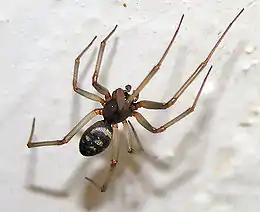 самиця Steatoda grossa | ||||||||||||||||
| Біологічна класифікація | ||||||||||||||||
| ||||||||||||||||
Різноманіття | ||||||||||||||||
| 109 родів, 2295 видів | ||||||||||||||||
 | ||||||||||||||||
Роди | ||||||||||||||||
|
дивитись текст | ||||||||||||||||
Посилання | ||||||||||||||||
| ||||||||||||||||
Опис
Невеликі і середніх розмірів павуки, зазвичай 2-10 мм, зрідка більші. Форма тіла дуже різноманітна, особливо у тропічних видів. На кінцях задніх ніг кілька вигнутих щетинок, що призначені для закидання здобичі клейкими нитками (характерний прийом павуків-тенетників).
Павуки-тенетники завжди менш повороткі, ніж павуки, що не користуються ловецьким приладдям, і тілобудова у них менш «спортивна» — тонші, довші і слабкіші ноги, більш товсте, роздуте черевце.
Спосіб життя
Павуки цієї родини трапляються у найрізноманітніших біотопах — у різних типах лісів, замешкуючи всі яруси, від підстилки до крон дерев, мешкають у пустелях, агроландшафтах, печерах, будівлях людини. Для більшості тенетників характерні мисливські тенета двох видів. Неправильна сітка має вигляд системи перехресних ниток, частина з яких несе клейкий секрет. Такі тенета характерні здебільшого для павуків роду Theridion і пристосовані для ловіння дрібних літаючих і стрибаючих комах (комарів, мух, цикадок). Впорядковані сітки (павуки родів Dipoena, Srteatoda та ін), споруджуються у вигляді ковпачка кулястої форми, оберненого отвором додолу і замаскованого зверху рештками комах і частинками рослин, слугують для лову нелітаючих членоногих — мурах, личинок прямокрилих, жуків, інших павуків і т. д. Деякі види харчуються виключно мурахами.
Тенета можуть слугувати і лігвом для павука, але іноді влаштовуються спеціальні кубла, замасковані піщинками, шматочками ґрунту і глицею. Копуляція відбувається у тенетах самиці. Інколи після парування самиця з'їдає самця (самиці каракурта Latrodectus spp. та ін.) Самиця охороняє кокони і тримає їх у заростях або на тенетах. Деякий час молодь мешкає у гнізді. Самиця перший час охороняє потомство і навіть підгодовує, відригуючи вміст горлянки.
Палеонтологія
За викопними рештками, що відомі починаючи з юрського періоду, описано 187 видів
Класифікація
Родина нараховує 109 родів[1].
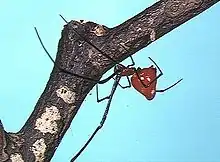
(підродина Argyrodinae)
- Argyrodinae
- Argyrodes Simon, 1864
- Neospintharus Exline, 1950
- Ariamnes Thorell, 1869
- Deelemanella Yoshida, 2003
- Faiditus Keyserling, 1884
- Rhomphaea L. Koch, 1872
- Spheropistha Yaginuma, 1957
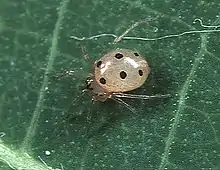
(підродина Hadrotarsinae)
- Hadrotarsinae
- Anatea Berland, 1927
- Audifia Keyserling, 1884
- Dipoena Thorell, 1869
- Dipoenata Wunderlich, 1988
- Emertonella Bryant, 1945
- Euryopis Menge, 1868
- Eurypoena Wunderlich, 1992
- Gmogala Keyserling, 1890
- Guaraniella Baert, 1984
- Hadrotarsus Thorell, 1881
- Lasaeola Simon, 1881
- Phycosoma O. P.-Cambridge, 1879
- Yaginumena Yoshida, 2002
- Yoroa Baert, 1984
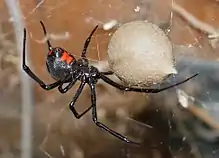
- Latrodectinae Petrunkevitch, 1928
- Crustulina Menge, 1868
- Latrodectus Walckenaer, 1805
- Steatoda Sundevall, 1833
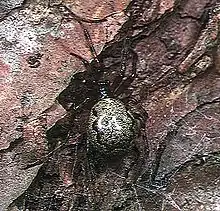
(підродина Pholcommatinae)
- Pholcommatinae Simon, 1894
- Asygyna Agnarsson, 2006
- Carniella Thaler & Steinberger, 1988
- Cerocida Simon, 1894
- Craspedisia Simon, 1894
- Enoplognatha Pavesi, 1880
- Helvidia Thorell, 1890
- Pholcomma Thorell, 1869
- Phoroncidia Westwood, 1835
- Proboscidula Miller, 1970
- Robertus O. P.-Cambridge, 1879
- Selkirkiella Berland, 1924
- Styposis Simon, 1894
- Theonoe Simon, 1881
- Wirada Keyserling, 1886

(підродина Spintharinae)
- Sphintharinae
- Chrosiothes Simon, 1894
- Episinus Walckenaer, in Latreille, 1809
- Moneta O. P.-Cambridge, 1870
- Spintharus Hentz, 1850
- Thwaitesia O. P.-Cambridge, 1881
- Stemmops O. P.-Cambridge, 1894
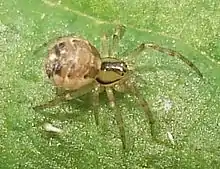
(підродина Theridiinae)
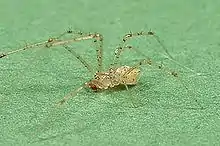
(підродина Theridiinae)
- Theridiinae
- Achaearanea Strand, 1929
- Achaearyopa Barrion & Litsinger, 1995
- Ameridion Wunderlich, 1995
- Cabello Levi, 1964
- Cephalobares O. P.-Cambridge, 1870
- Chrysso O. P.-Cambridge, 1882
- Coleosoma O. P.-Cambridge, 1882
- Cyllognatha L. Koch, 1872
- Dipoenura Simon, 1908
- Echinotheridion Levi, 1963
- Exalbidion Wunderlich, 1995
- Helvibis Keyserling, 1884
- Histagonia Simon, 1895
- Jamaitidion Wunderlich, 1995
- Keijia Yoshida, 2001
- Macaridion Wunderlich, 1992
- Molione Thorell, 1892
- Neottiura Menge, 1868
- Nesticodes Archer, 1950
- Nipponidion Yoshida, 2001
- Paratheridula Levi, 1957
- Propostira Simon, 1894
- Rugathodes Archer, 1950
- Sardinidion Wunderlich, 1995
- Simitidion Wunderlich, 1992
- Takayus Yoshida, 2001
- Tekellina Levi, 1957
- Theridion Walckenaer, 1805
- Theridula Emerton, 1882
- Thymoites Keyserling, 1884
- Tidarren Chamberlin & Ivie, 1934
- Wamba O. P.-Cambridge, 1896
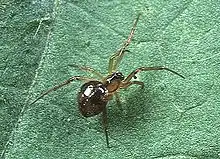
- Anelosimus Simon, 1891
- Astodipoena Petrunkevitch, 1958 † (Еоцен)
- Chorizopella Lawrence, 1947
- Clya Koch & Berendt, 1854 † (Еоцен)
- Coscinida Simon, 1895
- Eodipoena Petrunkevitch, 1942 † (Еоцен)
- Eoysmena Petrunkevitch, 1942 † (Еоцен)
- Flegia Koch & Berendt, 1854 † (Еоцен)
- Hetschkia Keyserling, 1886
- Icona Forster, 1955
- Kochiura Archer, 1950
- Landoppo Barrion & Litsinger, 1995
- Marianana Georgescu, 1989
- Mictodipoena Petrunkevitch, 1958 † (Еоцен)
- Municeps Petrunkevitch, 1942 † (Еоцен)
- Nactodipoena Petrunkevitch, 1942 † (Еоцен)
- Paidiscura Archer, 1950
- Tomoxena Simon, 1895
- Zercidium Benoit, 1977
Примітки
Джерела
- Agnarsson I. 2006a. A revision of the New World eximius lineage of Anelosimus (Araneae, Theridiidae) and a phylogenetic analysis using worldwide exemplars. Zoological Journal of the Linnean Society 146: 453–593. PDF
- Agnarsson I. 2006b. Asymmetric female genitalia and other remarkable morphology in a new genus of cobweb spiders (Theridiidae, Araneae) from Madagascar. Biological Journal of the Linnean Society 87: 211–232. PDF
- Agnarsson I. 2006c. Phylogenetic placement of Echinotheridion (Araneae: Theridiidae) — do male sexual organ removal, emasculation, and sexual cannibalism in Echinotheridion and Tidarren represent evolutionary replicas? Invertebrate Systematics 20: 415–429. PDF
- Agnarsson I. 2004. Morphological phylogeny of cobweb spiders and their relatives (Araneae, Araneoidea, Theridiidae). Zoological Journal of the Linnean Society 141: 447–626. PDF
- Cooperative behavior of Anelosimus jabaquara (2002). PDF
- Arnedo, M.A., Coddington, J., Agnarsson, I. & Gillespie, R.G. (2004). From a comb to a tree: phylogenetic relationships of the comb-footed spiders (Araneae, Theridiidae) inferred from nuclear and mitochondrial genes. Molecular Phylogenetics and Evolution 31:225-245. PDF
- Arnedo MA, Agnarsson I, Gillespie RG. In Press. Molecular insights into the phylogenetic structure of the spider genus Theridion (Araneae, Theridiidae) and the origin of the Hawaiian Theridion-like fauna. Zoologica Scripta.
- Aviles, L., Maddison, W.P. and Agnarsson, I. 2006. A new independently derived social spider with explosive colony proliferation and a female size dimorphism. Biotropica, 38: 743–753.
- Benjamin, S.P. and Zschokke, S. 2003. Webs of theridiid spiders: construction, structure and evolution. Biological Journal of the Linnean Society, 78: 293–305.
- Blackledge, T.A., Swindeman, J.E. and Hayashi, C.Y. 2005. Quasistatic and continuous dynamic characterization of the mechanical properties of silk from the cobweb of the black widow spider Latrodectus hesperus. Journal of Experimental Biology, 208: 1937–1949.
- Blackledge, T.A. and Zevenbergen, J.M. 2007. Condition dependent spider web architecture in the western black widow Latrodectus hesperus. Animal Behaviour, 73: 855–864.
- Gillespie, R.G. and Tabashnik, B.E. 1994. Foraging Behavior of the Hawaiian Happy Face Spider (Araneae, Theridiidae). Annals of the Entomological Society of America, 87: 815–822.
- Gillespie, R.G. and Tabashnik, B.E. 1989. What makes a happy face? Determinants of color pattern in the Hawaiian happy face spider Theridion grallator (Araneae, Theridiidae). Heredity, 62: 355–364.
- Grostal, P. and Walter, D.E. 1997. Kleptoparasites or commensals? Effects of Argyrodes antipodianus (Araneae: Theridiidae) on nephila plumipes (Araneae: Tetragnathidae). Oecologia, 111: 570–574.
- Oxford, G.S. and Gillespie, R.G. 1996. Quantum shifts in the genetic control of a colour polymorphism in Theridion grallator (Araneae: Theridiidae), the Hawaiian happy-face spider. Heredity, 76: 249–256.
- Oxford, G.S. and Gillespie, R.G. 1996. Genetics of a colour polymorphism in Theridion grallator (Araneae: Theridiidae), the Hawaiian happy-face spider, from greater Maui. Heredity, 76: 238–248.
- Purcell, J. and Aviles, L. 2007. Smaller colonies and more solitary living mark higher elevation populations of a social spider. Journal of Animal Ecology, 76: 590–597.
- Vollrath, F. 1979. Behavior of the Kleptoparasitic Spider Argyrodes-Elevatus (Araneae, Theridiidae). Animal Behaviour, 27: 515–521.
- Platnick, N.I. 2006. World Spider Catalog
- Key to several Theridiidae genera
- Tree of Life: Theridiidae
- Theridiidae research